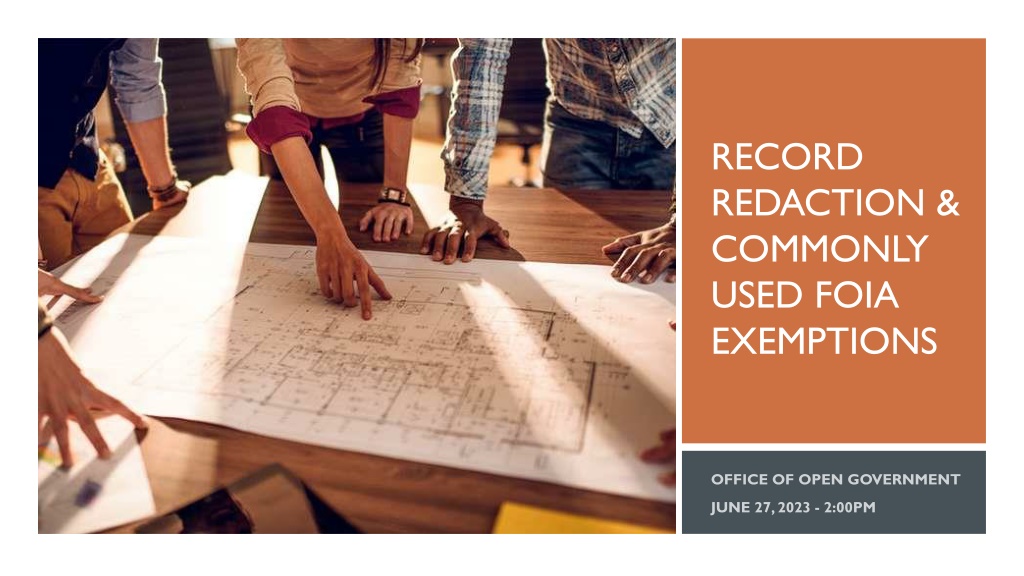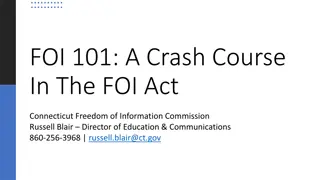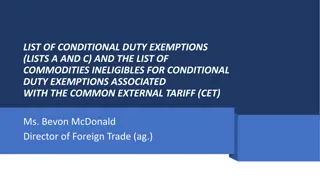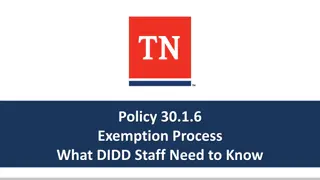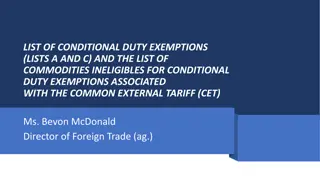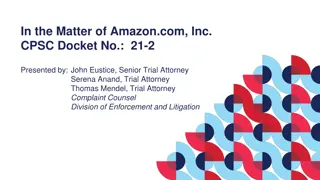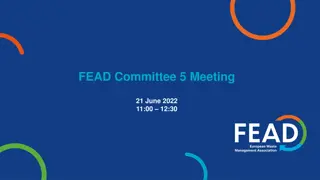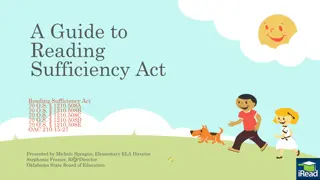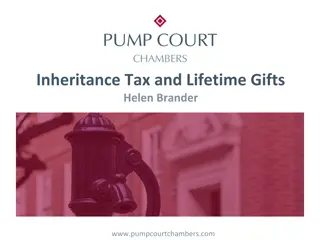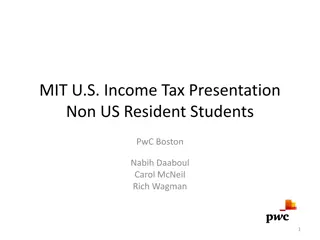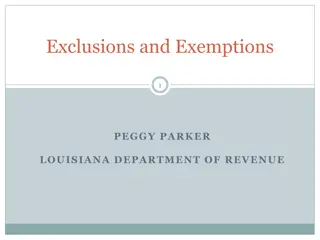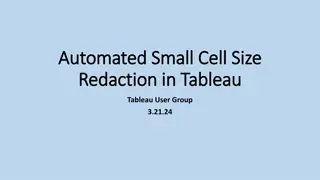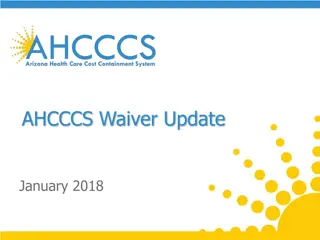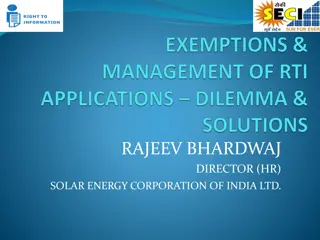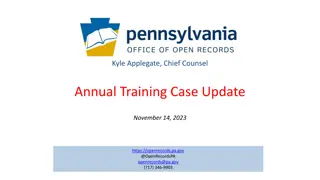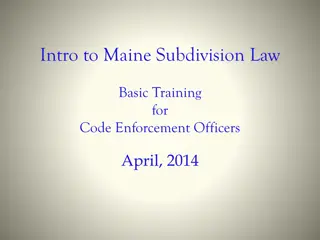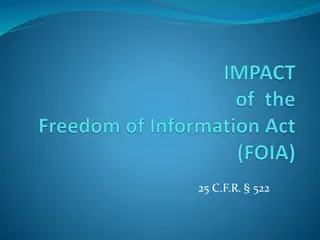Understanding FOIA Redaction and Exemptions
Explore the intricacies of redacting privileged information in records under the FOIA exemptions with guidance on reasonable redaction practices. Learn about common FOIA exemptions such as personal privacy, law enforcement, and agency communications, along with how to produce records with proper redactions as per D.C. Official Code.
Download Presentation

Please find below an Image/Link to download the presentation.
The content on the website is provided AS IS for your information and personal use only. It may not be sold, licensed, or shared on other websites without obtaining consent from the author. Download presentation by click this link. If you encounter any issues during the download, it is possible that the publisher has removed the file from their server.
E N D
Presentation Transcript
RECORD REDACTION & COMMONLY USED FOIA EXEMPTIONS
INSTRUCTOR Anthony J. Scerbo Attorney Advisor Office of Open Government D.C. Board of Ethics and Government Accountability Washington, D.C. anthony.scerbo1@dc.gov REDACTION & COMMONLY USED FOIA EXEMPTIONS 2
This Photo by Unknown Author is licensed under CC BY-SA QUESTIONS & ANSWERS During and after the presentation, if you have questions raise your hand in Teams or put it in the Chat. REDACTION & COMMONLY USED FOIA EXEMPTIONS 3
1 2 2 3 4 5 6 1 Redaction Identifying and obscuring privileged information. 2022 FOIA Report Details District s comprehensive FOIA activity. Trade Secrets D.C. FOIA Exemption #1. Personal Privacy D.C. FOIA Exemption #2. Law Enforcement D.C. FOIA Exemption #3. Agency Commun. D.C. FOIA Exemption #4. COURSE OUTLINE REDACTION & COMMONLY USED FOIA EXEMPTIONS 4
RECORD REDACTION HOW TO PERFORM REASONABLE REDACTION OF RECORDS
PRODUCING THE RECORDS: REASONABLE REDACTION e.g., document may contain parts that are protected by a privilege, and parts that are not protected the existence of the privileged parts cannot be used to justify withholding the non-privileged portions if reasonable redaction is possible. A record may only be withheld in its entirety if the agency determines that the record cannot be reasonably redacted. REDACTION & COMMONLY USED FOIA EXEMPTIONS 6
PRODUCING D.C. Official Code 2-534(b) states: (b)Any reasonably segregable portion of a public record shall be provided to any person requesting the record after deletion of those portions which may be withheld from disclosure pursuant to subsection (a) of this section. THE RECORDS: REASONABLE REDACTIONS In each case, the justification for the deletion shall be explained fully in writing, and the extent of the deletion shall be indicated on the portion of the record which is made available or published, unless including that indication would harm an interest protected by the exemption in subsection (a) of this section under which the deletion is made. If technically feasible, the extent of the deletion and the specific exemptions shall be indicated at the place in the record where the deletion was made. REDACTION & COMMONLY USED FOIA EXEMPTIONS 7
QUESTIONS TO ASK WHEN REDACTING 1. Am I withholding an entire record? 2. Are parts of the record not-exempt? 3. If I remove the not-exempt portions, is the document still legible? REDACTION & COMMONLY USED FOIA EXEMPTIONS 8
Did the search find responsive records? ANSWERS TO REASONABLE REDACTION QUESTIONS If the search yields nothing, then you are NOT withholding a record. Is the requester receiving everything found? Q1: AM I WITHHOLDING AN ENTIRE RECORD? If the requester got everything found, you are not withholding an entire record. REDACTION & COMMONLY USED FOIA EXEMPTIONS 9
If you were to pick any random part of the record, would that basis be applicable? ANSWERS TO REASONABLE REDACTION QUESTIONS If YES, it is proper to withhold in its entirety. If NO, you should be redacting and producing the record. Is the reason personal privacy? Does the ENTIRE record raise privacy concerns (e.g. a tax return) or only parts (e.g. a work email that has a post-script about a medical procedure)? Q2: YOUR AGENCY IS WITHHOLDING AN ENTIRE RECORD; WHAT IS THE BASIS FOR WITHHOLDING IT? Redacting personally identifying information (PII) may preserve privacy; if the record contains non-exempt content, you must produce the non-exempt content to the requester even if you redact some content, for example, to prevent a clearly unwarranted invasion of privacy. REDACTION & COMMONLY USED FOIA EXEMPTIONS 10
ANSWERS TO REASONABLE REDACTION QUESTIONS Are you withholding due to attorney-client privilege? Is all of the document embraced by that privilege? Was part of the communication shared with a third-party? Is the reason deliberative process? Does the ENTIRE record raise privacy concerns (e.g. a tax return) or only parts (e.g. a work email with a post-script about a medical procedure)? Q3: ARE PORTIONS OF THE RECORD NOT EXEMPT? Is the entire document part of the deliberation or are parts of it definitive statements of already established policy? Does the document contain purely factual information e.g. charts and graphs? Was the record shared with a third party? REDACTION & COMMONLY USED FOIA EXEMPTIONS 11
Are you withholding due to a commercial interest? ANSWERS TO REASONABLE REDACTION QUESTIONS Would the release of the entire document cause harm? Or would only the release of dollar amounts cause harm? Q3: ARE PARTS OF THE RECORD NOT EXEMPT? REDACTION & COMMONLY USED FOIA EXEMPTIONS 12
REASONABLE REDACTION QUESTION 3: If I remove the exempt portions, is the document still legible? "non-exempt portions of a document must be disclosed unless they are inextricably intertwined with exempt portions. Mead Data Cent., Inc. v. United States Dep't of the Air Force, 566 F.2d 242, 260 (D.C. Cir. 1977). https://www.justice.gov/oip/blog/foia-update-oip-guidance-reasonable- segregation-obligation If you redacted all exempt portions, would you be looking at a wall of black ink? If so, then you don t have to engage in redaction. Are there paragraphs or pages that would not be exempt? If so, then you redact and release. REDACTION & COMMONLY USED FOIA EXEMPTIONS 13
SCOPING Once I have identified a responsive record, can I redact information within the record that is non-responsive? (A practice known as scoping ) Once the government concludes that a particular record is responsive to a disclosure request, the sole basis on which it may withhold particular information within that record is if the information falls within one of FOIA s statutory exemptions. American Immigration Lawyers Ass n v. Executive Office for Immigration Review, 830 F.3d 667 (D.C. Cir. 2016). What does this mean? That discrete information within a responsive record cannot be redacted on the basis of non- responsiveness. It can be redacted only if a statutory exemption applies. REDACTION & COMMONLY USED FOIA EXEMPTIONS 14
COMMONLY USED FOIA EXEMPTIONS 2022 REPORT & AGENCIES
2022 FOIA REPORT Each year, the Mayor requests info from each public body and submits a comp. report to the D.C. Council, covering public record disclosure activities of each public body during the preceding fiscal year. D.C. Official Code 2-538(a). We will cover these statistics: Total FOIA Requests in 2022 Exemptions used over 300 times Agencies with Highest Requests 16
2022 FOIA REPORT STATISTICS Access the 2022 FOIA Report here: https://os.dc.gov/page/annual-reports Total Number of FOIA Requests in 2022: 11,522 Total Number in 2021: 9,655 REDACTION & COMMONLY USED FOIA EXEMPTIONS 17
AGENCIES WITH THE HIGHEST NUMBER OF REQUESTS ABCA 345 DOEE 856 DC Health 669 DOES 479 DCRA 1324 *(DoB & DLCP, now) FEMS 1499 DC BOE 352 MPD 2084 DDOT 432 OUC 352 REDACTION & COMMONLY USED FOIA EXEMPTIONS 18
MOST FREQUENTLY USED D.C. FOIA EXEMPTIONS Exemption 1 Trade Secrets - 458 Exemption 2 Personal Privacy - 2911 Exemption 3 Law Enforcement - 1366 Exemption 4 Agency Communication - 302 REDACTION & COMMONLY USED FOIA EXEMPTIONS 19
DESCRIPTION OF THE EXEMPTIONS Exemption 1: Protects trade secrets and commercial or financial information obtained from a person that is privileged or confidential. Exemption 2: Protects information about individuals when the disclosure would constitute a clearly unwarranted invasion of personal privacy. Exemption 3: Protects certain investigatory records compiled for law enforcement purposes (including the records of Council investigations). Exemption 4: Protects inter-agency or intra-agency deliberative and predecisional materials written as part of the decision-making process in D.C. agencies. REDACTION & COMMONLY USED FOIA EXEMPTIONS 20
APPLICATION OF FEDERAL FOIA TO D.C. FOIA D.C. FOIA was modeled on the corresponding federal Freedom of Information Act. Barry v. Washington Post Co., 529 A.2d 319, 321 (D.C. 1987). Accordingly, decisions construing the federal statute are instructive and may be examined to construe the local law, Washington Post Co. v. Minority Bus. Opportunity Comm n, 560 A.2d 517, 521 n.5 (D.C. 1989), where the language is identical. REDACTION & COMMONLY USED FOIA EXEMPTIONS 21
TRADE SECRETS To withhold responsive records under Exemption 1, the agency must show that the information: (1) is a trade secret or commercial or financial information; (2) was obtained from outside the government; and (3) would result in substantial harm to the competitive position of the person from whom the information was obtained. D.C. Official Code 2-534(a)(1). REDACTION & COMMONLY USED FOIA EXEMPTIONS 22
THE PROTECTION OF PROPRIETARY INTERESTS FROM PUBLIC DISCLOSURE. To withhold responsive records under Exemption 1, an agency must show that the information: (1) is a trade secret or commercial or financial information; (2) was obtained from outside the government; and (3) would result in substantial harm to the competitive position of the person from whom the information was obtained. D.C. Official Code 2-534(a)(1). The D.C. Circuit has defined a trade secret, for the purposes of the federal FOIA, as a secret, commercially valuable plan, formula, process, or device that is used for the making, preparing, compounding, or processing of trade commodities and that can be said to be the end product of either innovation or substantial effort. Public Citizen Research Group v. FDA, 704 F.2d 1280, 1288 (D.C. Cir. 1983). The D.C. Circuit has also instructed that the terms commercial and financial used in the federal FOIA should be accorded their ordinary meanings. Id at 1290. Exemption 1 has been interpreted to require both a showing of actual competition and a likelihood of substantial competitive injury. CNA Financial Corp. v. Donovan, 830 F.2d 1132, 1152 (D.C. Cir. 1987); see also, Washington Post Co. v. Minority Business Opportunity Com., 560 A.2d 517, 522 (D.C. 1989). REDACTION & COMMONLY USED FOIA EXEMPTIONS 23
THE PROTECTION OF PROPRIETARY INTERESTS FROM PUBLIC DISCLOSURE Exemption 1 Trade secrets and commercial or financial information obtained from outside the government, to the extent that disclosure would result in substantial harm to the competitive position of the person from whom the information was obtained. D.C. Official Code 2-534(a)(1) When does information provided to a federal agency qualify as confidential? REDACTION & COMMONLY USED FOIA EXEMPTIONS 24
THE PROTECTION OF PROPRIETARY INTERESTS FROM PUBLIC DISCLOSURE The Supreme Court held that information is confidential and protected if: (1) the information is customarily kept private, or at least closely held and (2) where the receiving party provides some assurance that the information will remain secret. Food Mktg. Inst. v. Argus Leader Media, 139 S.Ct. 2356 (June 24, 2019). REDACTION & COMMONLY USED FOIA EXEMPTIONS 25
DEPARTMENT OF JUSTICE GUIDANCE (FEDERAL EXEMPTION 4) GUIDE TO DETERMINING CONFIDENTIALITY (1) Does the submitter customarily keep the information private or closely held? If your answer is NO = NOT CONFIDENTIAL If your answer is YES = Move on to Question 2 (2) Did the government provide an express or implied assurance of confidentiality when the information was shared with the government? If your answer is NO = answer Question 3 If your answer is YES, the information is CONFIDENTIAL REDACTION & COMMONLY USED FOIA EXEMPTIONS 26
DEPARTMENT OF JUSTICE GUIDANCE (FEDERAL EXEMPTION 4) GUIDE TO DETERMINING CONFIDENTIALITY (3) Were there express or implied indications at the time the information was submitted that the government would publicly disclose the information? If your answer is NO, the information is CONFIDENTIAL . If the government is silent the submitter s routine practice will be sufficient to determine information is CONFIDENTIAL If your answer is YES, and no other countervailing factors exist, a submitter cannot expect the information to be CONFIDENTIAL . Source: www.justice.gov/oip/step-step-guide-determining-if-commercial-or-financial-information-obtained-person-condifential REDACTION & COMMONLY USED FOIA EXEMPTIONS 27
PERSONAL PRIVACY EXEMPTION 2 This Photo by Unknown Author is licensed under CC BY REDACTION & COMMONLY USED FOIA EXEMPTIONS 28
PERSONAL PRIVACY Exemption 2 Information of a personal nature where the public disclosure thereof would constitute a clearly unwarranted invasion of personal privacy. D.C. Official Code 2-534(a)(2). REDACTION & COMMONLY USED FOIA EXEMPTIONS 29
PERSONAL PRIVACY CASE EXAMPLES D.C. FOIA exempts the release of presentence reports, academic records, mental health assessments and other records pertaining to prison inmates' applications for minimum sentence reductions.See Hines v. Bd. of Parole, 567 A.2d 909, 913 (D.C. 1989). D.C. FOIA exempts personal information of public employees, unless the requestor shows that "the withheld information will shed light on an agency's performance of its statutory duties or otherwise let citizens know what the government is up to." Fraternal Order of Police v. District of Columbia, 124 A.3d 69, 77 (D.C. 2015) (internal quotation marks omitted). REDACTION & COMMONLY USED FOIA EXEMPTIONS 30
PERSONAL PRIVACY FEDERAL VS. D.C. D.C. FOIA s privacy exemption is broader than that of federal law. Unlike the language of the federal statute, which limits its comparable exemption to personnel, medical and similar files, the disclosure of which would constitute a clearly unwarranted invasion of personal privacy, see 5 U.S.C.A. 552(b)(6), D.C. FOIA exempts all information of a personal nature the disclosure of which would constitute a clearly unwarranted invasion of privacy. REDACTION & COMMONLY USED FOIA EXEMPTIONS 31
32 When determining whether the exemption for personal privacy would apply to the requested records, both D.C. FOIA and federal FOIA apply the standard set forth in Department of Justice v. Reporters Comm. for Freedom of Press, which requires that the government balance the individual s privacy interests against the public interest in disclosure. A FOIA Officer must perform the balancing test under this exemption: the individual's privacy interest in the material at issue must be balanced against the public interest in disclosing it, and this public interest must serve the "core purpose of shedding light on an agency's performance of its statutory duties." Department of Justice v. Reporters Comm. for Freedom of Press, 489 U. S. 749, 772, 109 S. Ct. 1468, 103 L. Ed. 2d 774 (1989) PERSONAL PRIVACY EXCEPTION BALANCING TEST
D.C. OOG ADVISORY OPINION #OOG-002.10.18.21_AO The initial question is whether there is a more than de minimis privacy interest in the records that are the subject of the FOIA request. Absent a more than de minimis privacy interest, the underlying principles of FOIA would require disclosure of the records. If established that the individual(s) maintain more than a de minimis privacy interest in the records, the next question is whether there is a public interest in disclosure that outweighs the privacy interest. To establish a FOIA public interest in disclosure, the information sought must serve the basic purpose of the Freedom of Information Act, to open agency action to the light of public scrutiny. When privacy interests are implicated, the burden is on the requestor to establish that disclosure would serve a significant public interest, and that interest must be more specific than having the information for its own sake. REDACTION & COMMONLY USED FOIA EXEMPTIONS 33
34 IN RE APPEAL OF THE WASHINGTON POST CO. The privacy interests of students and teachers under investigation for the consumption of alcohol substantially outweighs the public interest in their identifying information. PRIVACY EXEMPTION BALANCING TEST EXAMPLES IN RE APPEAL OF WALTER THOMAS May disclose names, professional qualifications, and work experiences of successful job applicants, but refuse to disclose other private information, such as home telephone numbers and addresses, Social Security numbers, marital status and personal references, or any information regarding unsuccessful job applicants.
LAW ENFORCEMENT Interfere with Investigation Right to a Fair Trial Personal Privacy REDACTION & COMMONLY USED FOIA EXEMPTIONS 35
LAW ENFORCEMENT EXEMPTION D.C. FOIA exempts certain investigatory records compiled for law enforcement purposes (including the records of Council investigations). 2014) (holding that records concerning use of breathalyzer were exempt only if "(1) the documents requested . . . [were] compiled for law enforcement purposes, and (2) disclosure of those documents would interfere with enforcement proceedings."); Barry v. Washington Post Co., 529 A.2d at 321-22. The exemption allows nondisclosure when disclosure would interfere with enforcement proceedings or Council investigations, deprive a person of a fair trial, constitute an unwarranted invasion of privacy, disclose the identity of a confidential source, disclose investigation techniques, or endanger the lives of law enforcement officers. D.C. Official Code 2-534(a)(3). Law Enforcement records are exempt, however, only if their release would also result in the interference with enforcement proceedings or cause one of the other results described in D.C. Official Code 2- 534(a)(3). See In re Appeal of Ernest Middleton, Matter No. 01-171746, 48 D.C. Reg. 9022 (Office of the Secretary, Sept. 19, 2001); In re Appeal of Mark W. Howes, Esq., Matter No. 00-10587, 48 D.C. Reg. 7827 (Office of the Secretary, Aug. 13, 2001). The exemption applies only to investigatory records that are compiled in the course of specific investigations and that focus on specific individuals and acts. See Fraternal Order of Police, Metro. Labor Comm. v. District of Columbia, 82 A.3d 803, 815 (D.C. REDACTION & COMMONLY USED FOIA EXEMPTIONS 36
LAW ENFORCEMENT EXEMPTION Threshold requirement for this exemption to apply is the record or information sought must have been compiled for a law enforcement purpose. Additionally, courts have found the threshold satisfied for non-investigatory records provided they involve a law enforcement purpose, such as law enforcement manuals, but have denied protection when the agency failed to establish a sufficient connection between the records and any law enforcement function. Courts have held that the law enforcement purpose encompasses a wide variety of records and information. Records compiled as part of violent investigations or drug trafficking investigations, including records pertaining to the use of informants, have been found to meet the threshold. Records compiled as part of investigations into non-violent illegal activity have been found to satisfy the threshold, as have records used in efforts to prevent wrongful activity. REDACTION & COMMONLY USED FOIA EXEMPTIONS 37
LAW ENFORCEMENT EXEMPTION Courts grant agencies wide latitude in defining their law enforcement purposes. Courts have denied protection under law enforcement exemption when the agency did not adequately demonstrate that (1) the records were compiled as part of the agencies' stated law enforcement purposes and duties; or (2) the records existed independently of the stated law enforcement purpose; or (3) the connection to law enforcement was pretextual; or (4) the associated investigation was conducted for an improper purpose. REDACTION & COMMONLY USED FOIA EXEMPTIONS 38
LAW ENFORCEMENT EXEMPTION EXAMPLES D.C. FOIA "seeks to strike a balance for maximum disclosure even of law enforcement information, but not in cases where the information would endanger people, interfere with due process or severely hamper law enforcement effort." Comm. on Judiciary Report, at 7. Example: the Mayor s Office of Legal Counsel (MOLC) has ruled that investigatory records in a 6-year-old murder case are exempt from disclosure if charges and criminal litigation are still possibilities. Glenn A. Stanko, Esq. v. Metro. Police Dep't, FOIA App. No. 92-24 (Feb. 24, 1995). Example: the MOLC held that the privacy interests of police and the crime victim's family militate against releasing a videotaped murder confession that was never admitted into evidence against the accused when the tape was sought by a news reporter. In re Appeal of Molly Pauker, Esq., (unnumbered FOIA appeal) (Office of the Mayor, Nov. 3, 1989). REDACTION & COMMONLY USED FOIA EXEMPTIONS 39
LAW ENFORCEMENT EXEMPTION The MOLC also held that disclosing a police officer's records regarding an investigation into her alleged drug abuse, when no disciplinary charges were brought and absent allegations that the investigation was mishandled, would serve no public purpose. Pretext Servs. Inc. v. Metro. Police Dep't, FOIA App. No. 92-10 (Office of the Mayor, March 8, 1995). Example: D.C. FOIA provides that all complaints and other specific police records shall be open for inspection. D.C. Official Code 5-113.06; see also D.C. Official Code 2-534(c) ("This section shall not operate to permit nondisclosure of information of which disclosure is authorized or mandated by other law."). Therefore, the names of some 70 police officers and information about criminal charges filed against them were required to be disclosed under 5-113.06 [formerly D.C. Code 4-135]. Washington Post v. Metro. Police Dep't, FOIA App. No. 93-15 (Office of the Mayor, March 11, 1994). REDACTION & COMMONLY USED FOIA EXEMPTIONS 40
LAW ENFORCEMENT EXEMPTION 3(C) PERSONAL PRIVACY Exemption 3(c) provides an exemption for disclosure for [i]nvestigatory records compiled for law- enforcement purposes, including the records of Council investigations and investigations conducted by the Office of Police Complaints, but only to the extent that the production of such records would . . . (c) Constitute an unwarranted invasion of personal privacy. While Exemption 2 requires that the invasion of privacy be clearly unwarranted, the word clearly is omitted from Exemption 3(c). Thus, the standard for evaluating a threatened invasion of privacy interests under Exemption 3(c) is broader than under Exemption 2. See United States Dep t of Justice v. Reporters Comm. for Freedom of Press, 489 U.S. 749, 756 (1989). REDACTION & COMMONLY USED FOIA EXEMPTIONS 41
LAW ENFORCEMENT EXEMPTION 3(C) PERSONAL PRIVACY Records pertaining to investigations conducted by the MPD are exempt from disclosure under Exemption 3(c) if the investigations focus on acts that could, if proven, result in civil or criminal sanctions. Rural Housing Alliance v. United States Dep t of Agriculture, 498 F.2d 73, 81 (D.C. Cir. 1974). See also Rugiero v. United States Dep t of Justice, 257 F.3d 534, 550 (6th Cir. 2001)(The exemption applies not only to criminal enforcement actions, but to records compiled for civil enforcement purposes as well. ). REDACTION & COMMONLY USED FOIA EXEMPTIONS 42
LAW ENFORCEMENT EXEMPTION 3(C) Determining whether disclosure of a record would constitute an invasion of personal privacy requires a balancing of one s individual privacy interests against the public interest in disclosing the information. REDACTION & COMMONLY USED FOIA EXEMPTIONS 43
LAW ENFORCEMENT EXEMPTION 3(C) Absent substantial allegations of wrongdoing, courts generally recognize that law enforcement personnel have a privacy interest in nondisclosure of their names due to the potential for harassment or embarrassment if their identities are disclosed. See e.g., Dorsett v. United States Dep't of the Treasury, 307 F. Supp. 2d 28, 38-39 (D.D.C. 2004); Manna v. DOJ, 51 F.3d 1158, 1166 (3d Cir. 1995); see also Abraham & Rose, P.L.C. v. United States, 138 F.3d 1075, 1083 (6th Cir. 1998) (stating that clear privacy interest exists with respect to names, addresses, and other identifying information, even if it is already available in other public filings). REDACTION & COMMONLY USED FOIA EXEMPTIONS 44
AGENCY COMMUNICATION Inter-Agency or Intra-Agency Memo Inter-Agency or Intra-Agency Letters Litigation-Related REDACTION & COMMONLY USED FOIA EXEMPTIONS 45
AGENCY COMMUNICATION: INTERAGENCY MEMOS AND LETTERS (D.C. OFFICIAL CODE 2-534(a)(4)) This exemption covers inter-agency and intra-agency memorandums or letters (including memorandums or letters generated or received by the staff or members of the Council), which would not be available by law to a party in litigation with a public body. REDACTION & COMMONLY USED FOIA EXEMPTIONS 46
LITIGATION-BASED EXEMPTIONS D.C. Official Code 2-531(a)(4) provides an exemption from disclosure for privileges which could be asserted in litigation. Deliberative Process Privilege Attorney-Client Privilege Attorney Work Product This Photo by Unknown Author is licensed under CC BY-NC-ND REDACTION & COMMONLY USED FOIA EXEMPTIONS 47
AGENCY COMMUNICATION LITIGATION BASED PRIVILEGES D.C. FOIA expressly provides that the deliberative process privilege, the attorney work product privilege, and the attorney-client privilege are incorporated into the exemption in D.C. Official Code 2-534(a)(4). D.C. Official Code 2-534(e); see also Kane v. District of Columbia, 180 A.3d 1073, 1079-80 (D.C. 2018). Historically, the MOLC has used the common law deliberative process privilege to find documents are exempt from disclosure under D.C. Official Code 2-534(a)(4) because they would not be available to a party in litigation with the agency. REDACTION & COMMONLY USED FOIA EXEMPTIONS 48
AGENCY COMMUNICATION LITIGATION BASED PRIVILEGES Shaw Coal. Redevelopment Corp. v. Office of the Assistant City Adm'r for Econ. Dev., FOIA App. No. 90-20 (Office of the Mayor, July 17, 1994): withholding documents related to an executive decision about real estate development). Alonzo L. Williams v. Office of Superintendent, FOIA App. No. 95-10 (Office of the Mayor, Aug. 11, 1995): withholding memoranda from a hearing examiner whose recommendation was rejected by the Superintendent of Schools, the final arbiter of the decision at issue. In re Appeal of the ACLU (National Prison Project), Matter No. 00-118630, 48 D.C. Reg. 2407 (Office of the Secretary, Mar. 6, 2001): remanding case to D.C. Department of Corrections to determine whether requested memorandum is of a "predecisional" and "deliberative" character. REDACTION & COMMONLY USED FOIA EXEMPTIONS 49
AGENCY COMMUNICATION WHEN DOES THE EXEMPTION APPLY? To fall under the Exemption, the record must be a part of the agency s deliberation process. The Exemption protects the frank discussion of legal and policy matters, so the agency is not swayed by public opinion. The key test: (1) Is the document a final decision? (2) Are the they pre-decisional documents or documents that implement or explain the decision? (3) Communication from the decision-maker or to them? Example: Advice memos do not fall under the Exemption if they are FINAL drafts are viewed as deliberational and pre-decisional; thus, under the exemption. REDACTION & COMMONLY USED FOIA EXEMPTIONS 50
